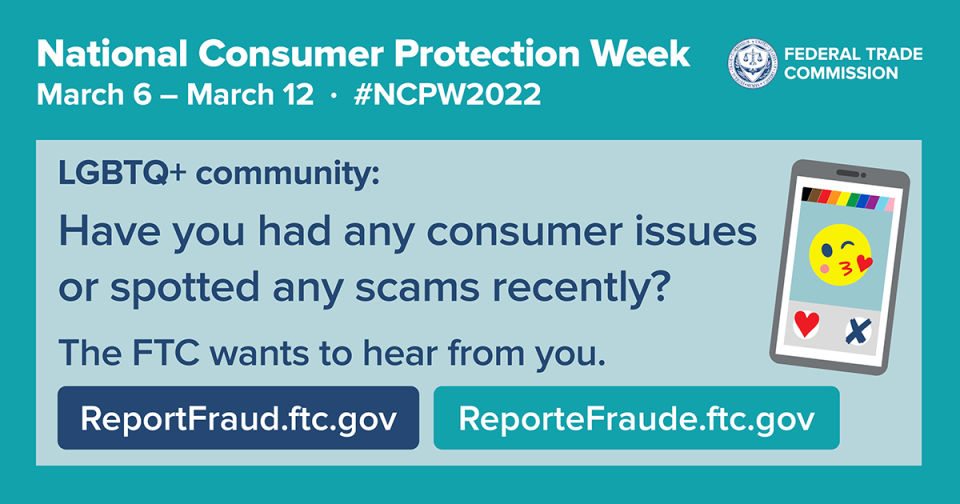This National Consumer Protection Week (NCPW), we’re focused on how scams affect every community — including the LGBTQ+ community. Scammers often like to impersonate familiar people, organizations, and companies that we know and trust. For the LGBTQ+ community, that can include “safe spaces” — or places where the LGBTQ+ community is free to proudly be ourselves.
Scammers can take advantage of those safe spaces — especially online. For example:
- Scammers target people on LGBTQ+ dating apps. Here, a scammer poses as a potential romantic partner on an LGBTQ+ dating app, chats with you, quickly sends explicit photos, and asks for similar photos in return. If you send photos, the blackmail begins.
- Job scams are everywhere. There are job boards particularly for LGBTQ+ applicants to find jobs with welcoming employers. But even if a job says it’s LGBTQ+ friendly, it might not be legit. Unfortunately, job scams can show up anywhere — including on those community boards.
And those are just two examples, and we know there are more. A lot more. So, we’re asking for your help: if you see a scam, or a friend or family member tells you about a scam — tell them to report it at ReportFraud.ftc.gov or, in Spanish, at ReporteFraude.ftc.gov. Every report helps the FTC fulfill its mission to protect every community from scammers. When you tell your story to the FTC, it’s shared with more than 3,000 law enforcers — and it helps the FTC and other law enforcement spread the word so others can avoid scams.
Check out what’s going on during #NCPW2022 at ftc.gov/ncpw. We hope to see you at some of the events.


It is your choice whether to submit a comment. If you do, you must create a user name, or we will not post your comment. The Federal Trade Commission Act authorizes this information collection for purposes of managing online comments. Comments and user names are part of the Federal Trade Commission’s (FTC) public records system, and user names also are part of the FTC’s computer user records system. We may routinely use these records as described in the FTC’s Privacy Act system notices. For more information on how the FTC handles information that we collect, please read our privacy policy.
The purpose of this blog and its comments section is to inform readers about Federal Trade Commission activity, and share information to help them avoid, report, and recover from fraud, scams, and bad business practices. Your thoughts, ideas, and concerns are welcome, and we encourage comments. But keep in mind, this is a moderated blog. We review all comments before they are posted, and we won’t post comments that don’t comply with our commenting policy. We expect commenters to treat each other and the blog writers with respect.
We don't edit comments to remove objectionable content, so please ensure that your comment contains none of the above. The comments posted on this blog become part of the public domain. To protect your privacy and the privacy of other people, please do not include personal information. Opinions in comments that appear in this blog belong to the individuals who expressed them. They do not belong to or represent views of the Federal Trade Commission.